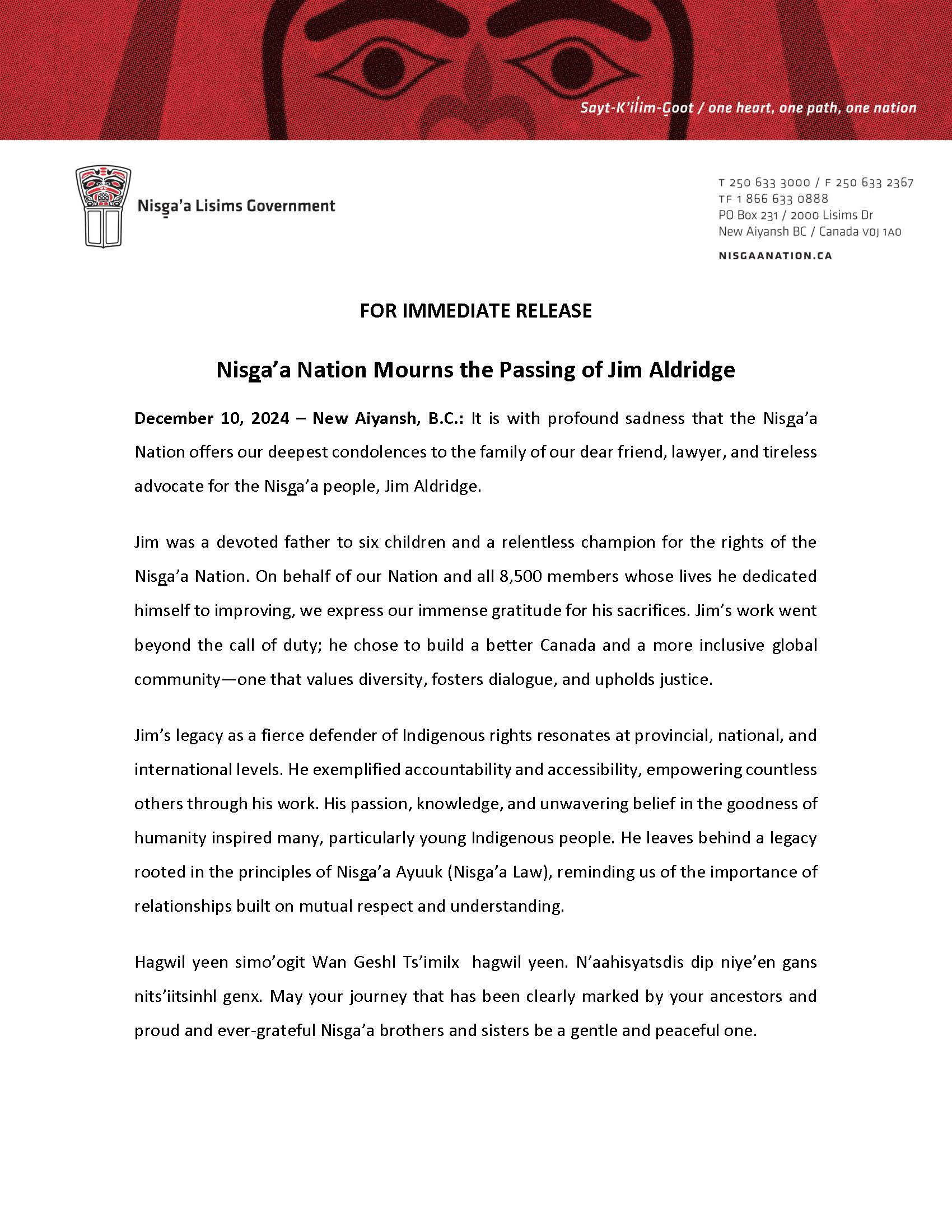
- Services
- Government
- Opportunities
- Culture
- News & Events
- Contact Us
- I want to
For Visitors
- Services
- Government
- Opportunities
- Culture
- News & Events
- Contact Us
- I want to

Home News & Events News Nisga’a Nation Commemoration of the Late Jim Aldridge

Wilps Hleek took Jim into our House and gave him a name reflecting his immense talent.
At the time, Jim was so excited that he invited an entourage to witness the ceremony.
Our history with Jim extends back nearly a half century.
When he first met us, our Late Uncle James Gosnell, was quickly impressed with Jim’s ability to craft an argument. Once telling him, “You think like us”.
And with us over the course of hundreds of meetings, deliberations, and into B.C. and Canadian court rooms, the smallest detail, or even a single word, never escaped his attention.
Judges and opposing lawyers regularly commented on Jim’s abilities to change their minds on something.
Jim’s passing is a profound loss of our Wilp. We are comforted by the countless memories of our time spent with him and his incredible value to our Nation.
With deepest condolences to Jim’s family.
Sim’oogit Hleek
Chief Harry Nyce Sr.
I did not know Jim as well as others in the Nisga’a nation, but I did notice that once he met you, he would always acknowledge you like he knew you… That’s a good feeling.
I know that I had asked Jim three really hard questions that he chose not to answer directly, instead he would reply, “We’re not going there.” And I’d ask, “That’s your lawyer response?” And he’d say, “Yep!” And I’m not going to lie, I told him if I could, I’d… And I could see him smiling.
I learned from two of the political people in my family who knew him better, that he was, indeed, a very good lawyer, and that Nisg̱a’a were lucky to have him represent them.
During COVID I did a Ppt presentation to the Executive on our history and following which Jim recalled a conversation that Adelle Gosnell and I had with him following the windup of one of the NTC conventions. He recalled us having a discussion about Nisg̱a’a women being the backbone of the nation, and then he commented, “And there it is,” referring to the presentation. More than Jim ever knew, to acknowledge Nisg̱a’a women in that fashion, was very much appreciated by the Nisg̱a’a women.
Though unable to obtain a transcript of Jim’s presentation to Wilp Si’ayuuḵhl Nisg̱a’a (WSN) in January of 2013 (following the 2012 Nisg̱a’a General Elections) I did take notes. Jim talked about the history encompassing the Nisg̱a’a land claims negotiations leading up to Nisg̱a’a Self-government. Just to highlight a few things he covered, as a reminder to us all:
Self-Government gets its authority from the Nisg̱a’a Nation Constitution (the Supreme Law).
Once you make laws you must follow them.
As “elected” your duty is to know all statutes / acts.
According to the Members’ Code of Conduct, you have a serious responsibility.
Much more legal wisdom was provided in this presentation for the WSN in which he also made reference to other WSN presenters in the past.
With great sadness Edmond Wright, former colleague and negotiator of the Nisga’a Treaty, reflects on Jim Aldridge’s life and role with the Nisga’a Nation
Jim began working for The Nisga’a Nation in 1980 as the primary legal counsel for the Nisga’a Treaty.
During negotiations Jim knew the Nisga’a Nation negotiation team so well that when an in-camera session was called in the “Nisga’a Language,” Jim participated in both Nisga’a and English.
Jim’s complete involvement in the Nisga’a negotiations discussion was an outstanding feature of his leadership and direction throughout the tripartite negotiations.
We spent many additional hours throughout the negotiation process resolving the details of each subject matter, often working late into the night or early morning hours. Jim never complained; he wanted to see that really come to fruition.
His passing is a significant loss to the Nisga’a Nation. All of us who worked with Jim will always remember his devotion to our nation, his legal advice, and how he proudly walked with us on May 11th, 2000, when we signed the first modern day treaty.
I want to express my sincere appreciation for all Jim did for the nation throughout the negotiation process, the setup of the Nisga’a government, his work with LCAC for Treaty Nations, and his continued guidance for the past 24 years as we work together to implement the Nisga’a treaty. He is a great loss to the Nisga’a nation.
K’alii-Aksim-Lisims, the Nass River, flows through a land of sacred mountains and dense forests on Canada’s Pacific Coast. The Nisg̱a’a people have lived in the Nass River Valley since before recorded time.
The Nisg̱a’a Final Agreement, British Columbia’s first modern treaty, recognizes Nisg̱a’a Lands and Nisg̱a’a Government. An example of hope, trust, and cooperation, the Nisg̱a’a Final Agreement is being studied by governments and Indigenous people the world over.
Copyright © Nisg̱a’a Lisims Government